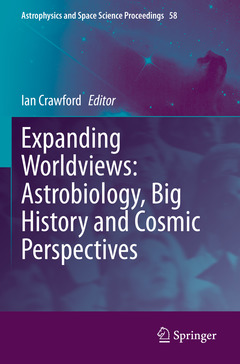Description
Expanding Worldviews: Astrobiology, Big History and Cosmic Perspectives, 1st ed. 2021
Astrophysics and Space Science Proceedings Series, Vol. 58
Coordinator: Crawford Ian
Language: English
Subjects for Expanding Worldviews: Astrobiology, Big History and...:
Publication date: 06-2022
377 p. · 15.5x23.5 cm · Paperback
Publication date: 06-2021
Support: Print on demand
Description
/li>Contents
/li>Biography
/li>Comment
/li>
This book collates papers presented at two international conferences (held at the Australian National University in 2018 and Birkbeck College London in 2019) exploring the relationships between big history and astrobiology and their wider implications for society. These two relatively new academic disciplines aim to integrate human history with the wider history of the universe and the search for life elsewhere. The book will show that, despite differences in emphasis, big history and astrobiology share much in common, especially their interdisciplinary approaches and the cosmic and evolutionary perspectives that they both engender.
Specifically, the book addresses the unified, all-embracing, nature of knowledge, the impact of big history on humanity and the world at large, the possible impact of SETI on astrobiology and big history, the cultural signature of Earth?s inhabitants beyond our own planet, and the political implications of a planetary worldview.
The principal readership is envisaged to comprise scholars working in the fields of astrobiology, big history and space exploration interested in forging interdisciplinary links between these diverse topics, together with educators, and a wider public, interested in the societal implications of the cosmic and evolutionary perspectives engendered by research in these fields.
Ian Crawford is Professor of Planetary Science and Astrobiology in the Department of Earth and Planetary Sciences, Birkbeck College, University of London, UK. His current research interests focus on lunar science, the search for life in the universe, and the future of space exploration. He has been at Birkbeck since 2003, where he was responsible for establishing the B.Sc. Degree in Planetary Science with Astronomy. Prior to his appointment at Birkbeck, Professor Crawford had a fifteen-year career as an observational astronomer at University College London, specialising is studies of the interstellar medium. He was President of the Society for Popular Astronomy for 2006-2008, and a Vice-President of the Royal Astronomical Society for 2017-2019.
Professor Crawford also has strong interests in the social and cultural implications of astrobiology and space exploration. In 2018, he was awarded a Visiting Fellowship at the Humanities Research Centre of the Australian National University to further explore these topics. This book is partly a result of that activity.
Professor Crawford was awarded the 2021 Service Award for Geophysics by the Royal Astronomical Society for his long-standing promotion of lunar science and human space exploration, his role as a mentor for young planetary scientists, and other contributions to the planetary science community over the last twenty years.
Provides an original interdisciplinary perspective on astrobiology, big history, space exploration, and related topics
Emphasizes the cosmic and evolutionary perspectives inherent in these topics
Includes a unique discussion of the societal and political implications of these perspectives




